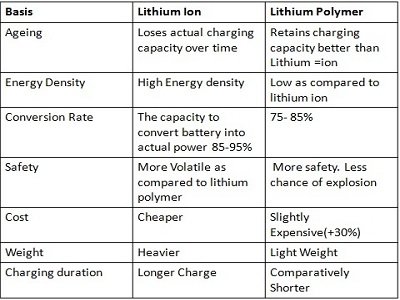Did you ever think about why your phone works at all? Probably not. But, if you think about it, all portable gadgets rely on a battery to keep ticking – and some have better battery life than others. That’s why we’re going to take a peek at what keeps your phone ticking and why some batteries do better than others.
On the basis of chemistry used for ions carrying electrolyte material, Lithium battery can be classified into Lithium ion and lithium Polymer.
Lithium ion battery uses liquid lithium ion as electrolyte while lithium polymer use solid or gelatin like polymers as electrolyte.
Lithium ion batteries have high energy density and cost less than lithium polymer. Lithium polymer batteries are light weight and have improved safety . However their cost is high (30% average) as compared to lithium ion. Also the the energy density of Li-Polymer battery compared to Li-Ion Batteries is quite less. Lithium ion batteries tend to lose charge with ageing even when not used, while Li- Polymer batteries retain charge for a longer period even while ageing.
This flow chart will clear the doubts:

Lithium polymer is more advanced but still have its own pros and cons and Lithium ion may be old but upgrading everyday with technology . so, we cannot say that lithium ion or lithium polymer is best for smartphone battery.
Considering the requirements of the smart phone in terms of weight, shape, size, energy density, usage etc , we have to decide, which is best in the case.
Why we need a polymer lithium-ion battery ?
Lithium-ion battery (Li-ion) is widely used in the communication and electronics industries as a high-efficiency energy carrier, especially for personal communication tools such as mobile phones and PDAs. It was first widely used in Japan after commercialization in 1992. Especially with the use of mobile phone communication tools, lithium batteries are gradually accepted by the majority of users due to their advantages of light weight, large capacity and environmental protection.
However, in the past ten years, with the rapid development of communication technology, mobile phone color screen technology, MMS technology, Bluetooth technology and camera technology have appeared successively, which puts higher requirements on the capacity, volume, weight and electrochemical performance of the battery. Traditional liquid lithium batteries have become increasingly unable to adapt to new demands. The emergence of a new polymer lithium-ion battery (Li-Polymer) caters to this demand. Polymer lithium battery is a third-generation lithium-ion battery developed on the basis of the original steel shell and aluminum shell battery. It is lighter, thinner and has higher energy density. It is accepted by domestic and foreign communication terminal manufacturers and design companies.
The fundamental difference between a polymer lithium-ion battery and a liquid lithium-ion battery is that the electrolytes used in the two are different. The electrolyte of a lithium polymer battery is solid in appearance and is called a polymer solid electrolyte. This electrolyte is a type of polymer material which is in a solid state but which dissolves the supporting electrolyte like a liquid and can undergo ion migration. Liquid lithium, as the name suggests, electrolytes are liquid. Due to the fluidity of liquids, changes in external environmental factors such as high temperatures have a greater impact than polymer lithium-ion batteries.
A lithium-ion battery or Li-ion battery is a type of rechargeable battery in which lithium ions move from the negative electrode to the positive electrode during discharge and back when charging.
They are common in home electronics. They are one of the most popular types of rechargeable batteries for portable electronics, with a high energy density, tiny memory effect and low self-discharge. They are used in military, battery electric vehicle, and aerospace applications.
A lithium polymer battery, or more correctly lithium-ion polymer battery is a rechargeable battery of lithium-ion technology using a polymer electrolyte instead of a liquid one.
These batteries provide a higher specific energy than other lithium battery types and are being used in applications where weight is a critical feature — like tablet computers, cellular telephone handsets, or radio-controlled aircraft.
Although the lithium-polymer battery is sleeker and thinner, lithium-ion batteries have a higher energy density and cost less to manufacture.
Finally, with new chemicals and such being added to these batteries often, who knows which will come out on top in the long run.
Read this article. It explains mostly everything about these 2 types of batteries. It's a good read.
Lithium Ion Battery vs. Lithium Polymer Battery – What’s the Difference?



